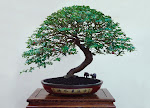 GOLDEN JUBILEE: Thamby Ayah Arunasalam and his wife, Saraswathy Ponniah, pose for the family album on their 50th wedding anniversary on Feb 6, 2003. Behind them are their daughters Padminee Ashwin, Malinee Navaratnam, Indirany Krishnamoorthy and Shanthinee Knott.
GOLDEN JUBILEE: Thamby Ayah Arunasalam and his wife, Saraswathy Ponniah, pose for the family album on their 50th wedding anniversary on Feb 6, 2003. Behind them are their daughters Padminee Ashwin, Malinee Navaratnam, Indirany Krishnamoorthy and Shanthinee Knott.New Straits Times, August 6th, 2008
By Aminuddin Mohsin
I WAS born in Ceylon (now Sri Lanka) on July 25, 1923, and I migrated to Malaya at the age of 17.
I spent my early years in Batu Pahat. World War 2 was in full swing then.
When the Japanese took over the administration of Malaya, I was chosen to supervise an oil palm estate in Kluang.
I quickly mastered the Japanese language. It made it easier for me to deal with Japanese officials. I was given many responsibilities, including purchasing food for the people of the estate.
Times were difficult then, there was a food shortage and life was hard. Every time I was sent to purchase rations, I risked my life by buying extra food, especially rice.
Times were difficult then, there was a food shortage and life was hard. Every time I was sent to purchase rations, I risked my life by buying extra food, especially rice.
It wasn't for me, it was for the needy. It was for my friends and neighbours who at times lived on tapioca and salt, without rice for weeks.
Rice was a rare commodity during the Japanese occupation. It was luxury if we had a plate of rice then. In fact, many basic necessities were luxury items, like match-sticks, meat, sugar, even a pair of slippers or the clothes on our backs. Getting caught buying rice without the knowledge of the Japanese soldiers meant death. They did not shy away from capital punishment. The most infamous was decapitation, a scary circumstance of that day and age.
The images of such executions continue to haunt Malaysians who lived during the war.But it was essential that I helped my fellow countrymen as many went without essential food, so I secreted as much rice for the people as I could get away with.
I enrolled in the British administration’s civil service on July 1, 1946, just a year after the war ended.
I was accepted as a clerk for Jabatan Kerja Raya (Public Works Department), and after I took the Cambridge test my pay was raised. My pay in those pre-independence times was 60 Malayan dollars before the test and 75 Malayan dollars after passing it.
They may seem like meagre sums but in those days that amount would definitely last you more than a month; nasi lemak only cost one to two cents.
I was placed in many different departments within the administration and I rose through the ranks to become chief clerk for marriage registrations in the Registrar’s Office.
I even went on trips to other states such as Sabah with the Johor administration.
In 1974, I was awarded the Pingat Ibrahim Sultan (P.I.S.) I was in the civil service for 32 years of my life — 32 years and 22 days, to be exact. I became a pensioner in 1978. My last working day was July 24.
During my days in the civil service I was also the president of the committee for the Rajamariamman Temple in the heart of town and played a major role in contributing to this social and spiritual institution of the Indian community.
Now in my twilight years, I live in Jalan Noja, in Kampung Bahru, Johor Baru. It is truly a beautiful neighbourhood filled with traditional charm and natural beauty.
Unfortunately, not all things stay the same.
When I moved here in 1979, you could still catch guppy fish from the drains or longkang but now that is just a memory: the drains are filthy and emit a terrible smell and rubbish litters the roads. There has been just too much development in the area. Quarters for teachers have been built right in front of my doorstep.
There are also many condominiums all around the area.
To top things off, many immigrants, who are the workforce behind this progress, have chosen to call Kampung Bahru their home too.
I am not blaming any one of these factors for the deterioration of the natural beauty of my kampung, but I believe it is the combined effect of all these forces that have caused such widespread contamination.
I hope the state government can do something to revive the old Kampung Bahru, full of natural beauty.





0 comments:
Post a Comment